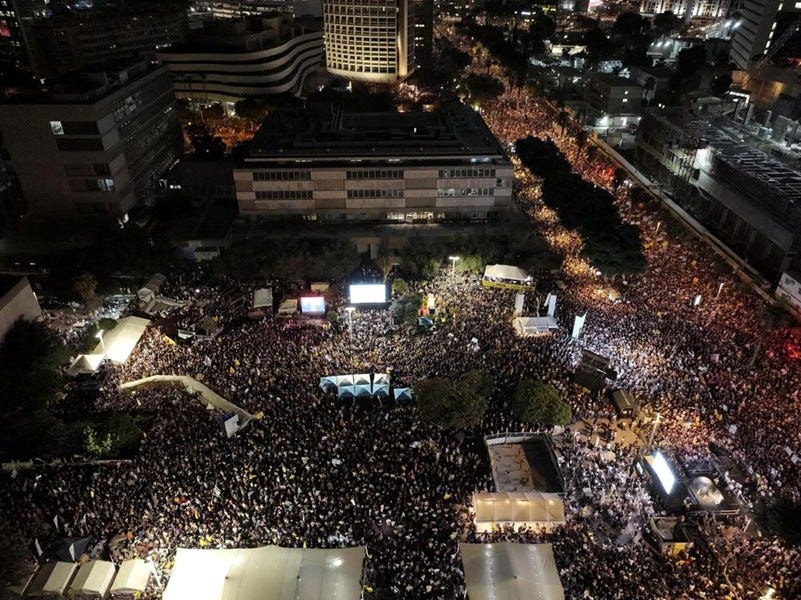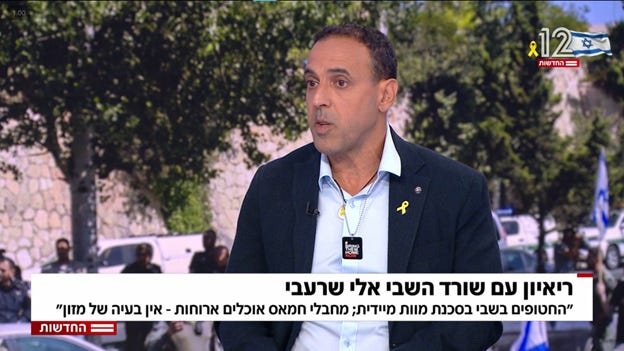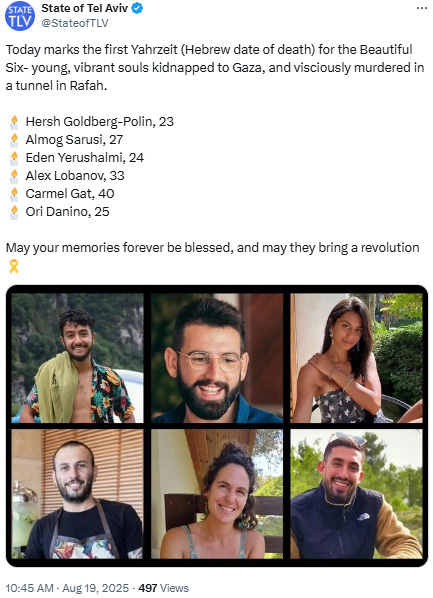1,000,000 People Took to the Streets of Israel
Sunday, August 19, 2025
I write this on Monday evening.
All day Sunday and into the evening, Israelis took to the streets. More than 22 months after October 7, they are stunned and horrified that hostages remain in captivity. That PM Netanyahu is directing the army to invade Gaza, yet again.
Throughout the day, close to one million people participated all over the country in demonstrations. There are ten million people in Israel and 80% are Jews. Realistically, that means that one in eight Israeli Jews took to the streets. That also means that deep discontent crosses all political lines.
The common concern is the government of Prime Minister Benjamin Netanyahu, who many believe to be leading the nation to the abyss. Perhaps we are already there.
It is difficult – based on my anecdotal interactions – for many people living outside of Israel to understand the depth and intensity of views on the ground. So in this piece, I will try to color in the picture by setting out the key issues tearing this country apart and that prompted this day of action.
The recent release of horrific videos of hostages Rom Braslavski and Evyatar David – the latter filmed while literally digging his own grave in a tunnel – devastated Israelis.
More than 75% of the population - according to successive polls – want an end to the war (we’ll get into what that might mean) and return of the hostages. Based on polling data they represent all political and socio-economic segments of society.
Shortly after the publication of the hostage videos, Prime Minister Netanyahu declared that Israel would occupy all of Gaza. We were going back in. A nation already in shock was even more shocked. If that’s possible.
All the while, the ultra-orthodox (haredim) were threatening, yet again, to bring down the government.
Why? They are demanding a law that will forever exempt haredi men from serving in the IDF. This, amidst a never-ending war. The IDF has a severe shortage of soldiers in the conscript army. Reservists – men with families and jobs – have served more than 500 days since October 7. Lives are falling apart. Resilience is a word that is overused when it comes to Israelis. People are not endlessly resilient. Not even Israelis.
As the week wore on, it seemed that Netanyahu changed his “strategy” daily. His initial pledge to implement full occupation with Jewish settlements in Gaza (pandering to his Kahanist, extremist coalition partners – Itamar Ben Gvir and Bezalel Smotrich) was modified. “OK”, he said. “We’ll go in and occupy Gaza City and probably Deir al Balah.” These are two central population clusters where it is believed hostages are being held.
Show your support for STLV at buymeacoffee.com/stateoftelaviv
Everyone. Like everyone – including Bibi’s loyal adviser, Ron Dermer – opposed this suggestion. It was widely perceived as being ill-advised, in the extreme.
Tsachi Hanegbi, Bibi’s National Security Adviser and a long-time Likud loyalist and hawk, opposed this initiative.
Eyal Zamir, the highly regarded IDF Chief of Staff appointed five months ago by Netanyahu was firmly opposed to this latest initiative. It was pointless, he said. We have been in and out of Gaza City countless times. We cannot win this war without a strategy. And we have no strategy.
What do we do once in Gaza City, he asked. International law, Zamir reminded Netanyahu, requires that as occupying nation Israel must manage all civilian services. Garbage removal. Utilities. The IDF has neither the soldiers nor operational capability to do this. So, he asked, what’s the plan?
The responses from Bibi were as they have been since October 7; to lash out at anyone who dared to dissent as being subversive. Deep state. Leftist anarchists. Disloyal. He openly challenged the IDF Chief of Staff and did nothing to manage his coalition partners who joined in the pile-on. It is impossible to overstate how many red lines this conduct crosses in Israel, where every family has a son, brother, father serving. Undermining the IDF Chief of Staff is simply not done.
And in this case, the prevailing view is that it is also undeserved.
“What”, Eyal Zamir asked, “what exactly are we going to do now that we have not done for the last 22 months? We are fighting a conventional war against a suicidal death cult. We know that the hostages will be murdered if we come close to their tunnel prisons. We know that the tunnels are rigged with explosives and cameras. The enemy has had close to 20 years to dig and prepare and plan. We must understand the reality of this war.” ( I am paraphrasing here many comments he has made in recent weeks.)
Reservists are being discharged en masse as I write. My kibbutz is hosting pool parties for large groups of men on their day of discharge. Full bar b q’s and a day of fun before they disperse all over the country, after having lived in sand dunes and devastation for 500 days.
As they plan a brief celebration and respite – incredibly -many of them are receiving new call up notices. Some are learning that their current reserve service is being extended by 40-60 days.
Let that sink in.
There are widespread discussions among reservists about not showing up. Which in this country is sacrilege. And unprecedented. That is how seriously serious things have become.
There are very few Israelis – even in the political right (with the exceptions of Ben Gvir and Smotrich) who support this continued war in Gaza. Without a doubt, every single Israeli wants Hamas destroyed and the Strip demilitarized. But they also want to salvage their country; its soul and physical capability.
It is challenging for people not living here to grasp the pressure on this country and the unceasing the strain on society.
By way of (very imperfect) analogy, recall that after 20 years in Afghanistan, the American-led coalition failed, utterly, to defeat the Taliban. ISIS-type extremists continue to flourish in the region. They are also quite literally taking over the west.
Hamas is but one part of a global terror network that poses a threat to the middle east and beyond. Israel needs help. Like boots on the ground help.
Fighting suicidal jihadis is challenging the civilized world. Israel, as always, just happens to be on the front lines.
That’s where the notion of strategy comes in. Israel needs a strategy. For working with Saudi Arabia. The UAE. America. And others. We need Egypt to be forced to set up a humanitarian zone for civilians, separating them from Hamas and PIJ fighters and weapons. Egypt has steadfastly refused to accede to this very reasonable wartime initiative.
We need western governments – led by the US – to freeze all Qatari assets. Had this been done on October 8 the hostages would likely have been returned, alive, on October 9. Maybe the 10th.
And yet, the west does not demand Qatari or Egyptian compliance. And the obvious question is: Why not? In what universe do we decide that this global issue is the primary responsibility of Israel?
Even the brilliant American air attack on the Iranian nuclear facility at Fordo last June was only possible because Israel had spent the preceding two weeks destroying every vestige of Iranian air defenses. Israel paved the runway so that the B-2s could swoop in and out and get the job done.
We now know that in the early days of the Israeli attack on Iran there were several close calls in which disabled Israeli jets nearly crashed. Over Tehran. That the operation was clean is a minor miracle. It was not a given.
The centrality of the hostages’ fate to the nation of Israel cannot be overstated. That issue is what galvanized close to one million people to take to the streets two days ago.
In the coming days, State of Tel Aviv will be following this very important moment in the history of the country. Because so much turns on what transpires in the very near future.
We have a podcast we will publish this week featuring a reserve soldier, father of five young boys, who served close to 400 days since October 7. With a small group of friends, he has established a political party that is polling very strongly. He also expects to receive another call-up notice in the near future. We discuss that as well.
Today, I am offering brief summaries of some key moments from Sunday, to convey to those living abroad how profoundly shaken Israelis are today. The belief that the coalition government is totally disconnected from the people is a deeply entrenched belief.
When men like Eyal Zamir, every living IDF Chief of Staff and Minister of Defense, former heads of Mossad, the current head of Mossad, the National Security Adviser, Netanyahu’s key adviser and confidante, when they oppose the Prime Minister – whose staunchest support comes from the right-wing extremist camp of his coalition – then it behooves us all to pay careful attention.
Below, I highlight four key takeaways from Sunday night, that had and conitnue to have an enormous influence on things in Israel:
The Polls
As the streets teemed with protesters on Sunday night, Israel’s channel 12 – the most watched television station in the country – reported on a current poll.
Here’s the bottom line. If elections were held today, every scenario shows Netanyahu and his coalition failing to form a government. They are short by approximately ten seats, depending on the final party configurations.
For example, should former IDF Chief of Staff, Gadi Eisenkot (who also left Benny Gantz’s party recently) run on a combined slate with former PM Naftali Bennett, their party would take 29 seats to Likud’s 24. But more importantly, whatever the configuration, Likud cannot form a government.
The haredi parties poll exactly as they always do since their base votes as commanded by the rabbinic leadership.
Other surprises? Yisrael Beiteinu leader Avigdor Lieberman seems to have almost doubled his potential mandates, from the current 7 to 11 or 12. Yair Lapid is floundering. Benny Gantz is polling below the threshold to make it into the Knesset. Smotrich is back in the running with four seats, following a long period on life support. This boost likely arises from his tough talk about resettling Gaza recently. Ben Gvir is polling around 6. And the new entrants – parties that are founded by reserve soldiers and whose focus is solely on ensuring that IDF service is a universal national value and policy – are polling at 5. Only one Arab party is likely to make it into the Knesset – with five mandates.
That is a very pared down summary but sets out the big picture battle lines as they seem to be shaping up. An election must be held by October, 2026, at the latest.
There have been reports that Netanyahu is working to establish a “shadow party” that would appear to be independent of Likud but would in effect be a controlled satellite. If true, that reflects the seriousness of Netanyahu’s political position.
Eli Sharabi Interview
Also on Sunday, an interview with Eli Sharabi was aired on Israeli TV. Sharabi was held hostage by Hamas for 491 days. Asked to comment on Netanyahu’s statement earlier that day – that the national protest only strengthened Hamas and weakened Israel’s position - Sharabi demurred.
“I do not want to argue with the Prime Minister,” he said, but he explained that his view of things was very different.
Sharabi reminded us that he had not been exposed to any news or media while in captivity. He knew nothing about efforts to free the hostages. He was unaware that his wife and daughters had been murdered on October 7. His captors deliberately misled him about this.
But today, Sharabi knows that other hostages were and are given information about the protests in Israel. And the hostages who have returned credited this with helping them to survive. It gave them the will to go on.
Now that he is free, Sharabi said he draws tremendous strength – “critical strength” – from this national support.
Speaking about the videos of Evyatar David and Rom Braslavski, Sharabi repeated several times that it will be a “great miracle” to see all the remaining hostages released. The phrase he used, in Hebrew, is what is invoked on Chanukah, when we celebrate the triumph of the Maccabi warriors over a repressive empire more than 2,000 years ago. It is a very high bar. Read into that what you will.
Sharabi said that the hostages are in immediate danger, as was he when released on February 8, 2025.
He weighed 44 kilos. The image of him, Ohad Ben Ami and Or Levy – all skeletal – shocked the world. And, perhaps most importantly, President Trump. The support of the President and his special envoy, Steve Witkoff, is thought by most Israelis to be the only reason that any hostages have been released in these past months. They are the only hope.
Sharabi shared that when released he had weeks to live. And this was after his captors had provided more food in the days leading up to his release.
While in the tunnels, starving, he saw dozens of boxes of food for his guards. There was no shortage for them. And this was long before the brief period in the spring when Israel blocked humanitarian aid going into Gaza. Hamas starved and starves hostages as a matter of policy. And they have done so since October 7.
For much of his time in captivity, Sharabi was held with 24-year-old Alon Ohel, with whom he forged an exceptionally close bond. Leaving him behind, alone, was devastating. Sharabi said that when he left he assured Alon that he would be out in a week or two. Because he believed that to be true. When Israel decided to go back to war before securing the release of the remaining hostages, he was shocked.
Like Sharabi, virtually every released hostage has expressed dismay upon returning to life in Israel; they cannot believe that the political leadership is debating whether or not to prioritize their release. They ask – what has become of the founding ethos of this nation?
Asked to speak directly to the Hamas hostages on Sunday night, in the chance that one or more may hear him, Sharabi said this: “We are doing everything we can to get you back. Your families are fighting like lions. You have to stay strong.”
Each time that hostage negotiations fell through, Sharabi said, the Hamas guards became crueler. Ohad Ben Ami – who was released on the same day as Sharabi – mentioned in an interview that one of his guards – the most sadistic, in fact – has a daughter who had been treated for cancer at a hospital in Israel.
“Anyone who thinks you can rescue hostages in the tunnels is living in an illusory world,” said Sharabi. “They do not understand the tunnels. I do.”
Should the IDF come near where they are being held, he is unequivocal in stating that they will be killed immediately by Hamas with a bullet to the head. Just as we saw happen one year ago with six young men and women.
In fact, it is exactly one year ago today, on the Jewish lunar calendar, that “The Beautiful Six”, as they have come to be known, were murdered in a tunnel at point blank range. Their bodies were retrieved by the IDF on August 31, 2024.
Three Women
Lishay Miran Lavi. Wife of Omri, 48 years old. They are the parents of four-year-old Roni and two-year-old Alma.
Vicki Cohen. Mother of IDF soldier captured in uniform, 21-year-old Nimrod.
Anat Angrest. Mother of 22 year- old- tank commander Matan, tortured horrifically and believed to have suffered permanent disabilities as a result.
All three men remain in Hamas captivity and are believed to be alive.
The three women appeared on television live on Sunday night from Tel Aviv’s Hostage Square, the culmination of the day’s events.
Asked to address Prime Minister Netanyahu’s comments about playing into Hamas’ hands, they spoke with one voice.
“You say this all the time. That is not what we hear from the hostages who have returned. Come and sit with us. Look us in the eyes and tell us that.”
This, of course, directly reminds the nation – and the Prime Minister – that he has avoided direct contact for almost two years with these parents; even the parents of IDF soldiers. It is incomprehensible, in this country, for the Prime Minister to be so detached.
President Trump. Steve Witkoff. They go out of their way to interact with these families and returned hostages, to show their humanity. As did President Biden.
“Bibi and his government keep trying to politicize this. We are so far beyond politics. We are looking at extremists (in the coalition government) who do not reflect our values. As happened with those who led us in the past (they are referring to the very distant past of the First and Second Temple eras); we are seeing the absolute corruption of our ideals. We have a government that is disconnected totally. Totally.”
Anat Angrest has seen unbearable videos of her tortured son in captivity. We know that he has been held for extended periods of time tightly shackled, in the tunnels, locked in a cage. In closing, she said this:
“There is no time for months-long military operations to go back into Gaza with no strategy. No end game. The IDF Chief of Staff – who Bibi appointed – says that. We have no strategy. No endgame.”
Eli Albag
Eli is the father of Liri, who was taken hostage by Hamas from the Nahal Oz IDF base on October 7. She was 18 years old. Liri was released on January 25, 2025. Her 20th birthday was on February 4.
She is one of the many hostages who has expressed shock at the country she returned to; that there was even a discussion about if and when to bring them home.
Her family advocated tirelessly for the hostages before she returned and remain committed to speaking on behalf of those still held by Hamas. Eli Albag was also interviewed on television on Sunday night, alongside Sigal Steiner-Mansouri.
Sigal’s daughters, Norelle (25) and Roya (22) were murdered at the Nova Music Festival, along with Norelle’s long time boyfriend, Amit Cohen (25), in a roadside bomb shelter. Norelle and Roya were born in Los Angeles. The family moved back to Israel when they were 12 and 9. They are survived by their parents, Sigal and Menashe, and their younger brother, Shai.
On Sunday morning, Sigal and others had organized a small demonstration outside the home of Minister of Education, Yoav Kisch. The Minister placed speakers in the front window of his home and blasted music, intended to drown out the speaker, who happened to be Sigal.
The lack of sensitivity – even if you feel strongly that demonstrating outside a Minister’s home is so wrong (and there are many do feel this way) – is arresting. The suffering of these people. The fact that we are 22-plus months into this war with no end in sight. The detachment throughout of this government. Leaves the majority of Israelis, today, speechless.
Eli Albag is what you call a “gever gever” in Hebrew. A man’s man. He has also grown increasingly enraged with PM Netanyahu and the members of this government. At one point, before his daughter was released, he was being denigrated by senior Likud members – as they do to all who disagree – as a leftist, subversive type. Albag rightly blew his stack, declaring on TV: “I’m the Likudnik of all Likudniks.” Meaning. I am as hardcore as it gets.
It is important to understand who Eli Albag was and is. He is no leftist anarchist. Which makes this clip – and his ferocious comments – all that much more powerful. His rage is heart stopping. I neither praise nor criticize. I show this video because it illustrates how profoundly this country has been shaken. (We have added English subtitles):
Eli Albag was a Likud poster boy on October 6. He is horrified; that we still have soldiers and civilians in captivity; by the callousness of the government; by the lack of a war strategy.
Conclusion
At the best of times, Israel is a very complex society. And these are far from the best of times.
What I hope I have done here is to clarify – in some small way - the pervasive discontent roiling this country and why the people are protesting.
Most Israelis believe that everything about this country is at stake. Including the immediate future.
This is not about being weak. Or lacking resolve. Or being subversive. Or disloyal. Or being too thick to understand the enemy. Or the broader geopolitical context.
No.
I believe that these protests are the purest expression of love of and devotion to this country and its future.
Extra Notes:
Podcast interview with Lishay Miran Lavi, published on February 11, 2025 , can be watched here.
Podcast interview with Idit Ohel, mother of hostage Alon Ohel, published on May 25, 2025 can be watched here.
Tomorrow, STLV will publish a transcript from a conversation with Amir Tibon about the impact of the Sunday protests. Amir is a long-time friend of mine and a very accomplished journalist. We met when I was serving as Canadian Ambassador to Israel. He is currently the diplomatic correspondent for Ha’aretz.
Amir is also a member of Kibbutz Nahal Oz. The story of his survival is the subject of a documentary film that will be shown in September at the Toronto International Film Festival.
Amir also authored a book about the harrowing experience of his family on October 7, entitled The Gates of Gaza. STLV wrote about this book here.
In November, 2023, Amir Tibon spoke with STLV and provided testimony of his experience. That podcast may be viewed here.









“Roadside Bomb shelters”, what other country on this planet has these?!
Israel does not deserve to have the PM it does have, even in a war he must go, this is the only refuge for Jews in this world, it must prevail. 🇨🇦 🇮🇱 🇺🇸 🙏 🚀🚀🚀